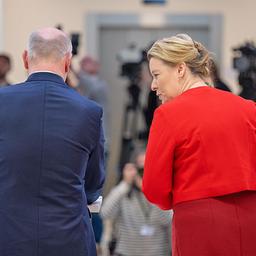It was only in the third ballot that CDU head of state Wegner was elected governing mayor of Berlin. However, there was no exuberant joy in any of the camps afterwards. There are different opinions about the role of the AfD.
It took Kai Wegner three attempts to get enough votes: The election of the CDU candidate as the new governing mayor of Berlin is now not without obstacles. After the election of CDU politician Kai Wegner as the new Governing Mayor of Berlin, there are different views as to how the majority came about.
The AfD claims to have voted for Wegner in the last ballot and thus helped him to the required majority. The voting was secret.
Kai Wegner was elected Governing Mayor of Berlin in the third ballot
Only at the third attempt did the Berlin MPs elect Kai Wegner as the new Governing Mayor of Berlin. In two ballots, the CDU candidate had previously missed the required majority.more
Wegner: “That’s exactly it coalition majority”
The new governing mayor, Kai Wegner, said on rbb that he did not believe that he received votes from the AfD parliamentary group. “We had 86 votes, that’s exactly the coalition majority,” said Wegner. “I believe that the AfD wants to create chaos here, they want to use it because, with the best will in the world, I can’t imagine the AfD electing a governing mayor who would bring the largest AfD hunter from all of Germany to Berlin.”
With this, Wegener alluded to the appointment of the new Berlin Justice Senator Felor Badenberg (independent, for the CDU), who, as deputy head of the Federal Office for the Protection of the Constitution, had previously spoken out in favor of the AfD being observed by the authority.
Saleh contradicts AfD
Berlin’s SPD state and parliamentary group leader, Raed Saleh, presented the situation differently: “In the end, it worked with our own majority of 86 votes.” The fact that three ballots were necessary was not nice. “But it’s not the first time it doesn’t work in the first or second ballot,” Saleh said. “That’s exactly why the constitution provides for three rounds of voting. But of course I would have preferred something else.”
Wegner’s predecessor Franziska Giffey from the SPD also rejected the AfD statement and spoke of a “chaotic allegation”. The red-black coalition has 86 votes and these are exactly the votes that ensured that Wegner was elected governing mayor.
Jarasch: “Massive damage to the city”
It’s a difficult day, according to Giffey, but Berlin will get a state government that is capable of acting. Green MP Bettina Jarasch said it was a disastrous start for the government. Black and red cannot rely on their own majority.
Jarasch explained on Twitter that the possibility that Wegner could have received votes from the AfD parliamentary group in the third ballot stuck on that day and was causing “massive damage to the city, democracy and the political culture”.
Greens Federal Chairwoman Ricarda Lang wrote on Twitter: “The SPD and the CDU in Berlin have done great damage to the city, democracy and the political culture today by going into the third ballot without a secure majority – and thus allowing that the AfD can claim Wegner’s election for itself.” Jan Korte, leader of the Left parliamentary group in the Bundestag, wrote: “Wegner has no scruples about being sworn in, despite the suspicion of being the governing mayor by the grace of the AfD fascists.”

Black-Red starts with ballast in their luggage
The majority of SPD members said “yes” to the coalition with the CDU. The CDU members also voted unanimously for it. But the coalition does not stand on a stable foundation, comments Jan Menzel.more
“Political shambles”
Left country chief Katina Schubert said on rbb: “We have never experienced what happened here in Berlin. The fact that a governing mayor does not have a majority in the factions that are supposed to support him is a difficult situation. He will help have to live with the blemish of possibly having been elected with AfD votes.”
The Berlin AfD parliamentary group leader Kristin Brinker could not say how many of her colleagues had actually voted for Wegner. “It was a secret ballot,” she said. “Not all MPs were there, there were also some who didn’t want to vote for Wegner.” When asked by the German Press Agency, five of the 17 AfD parliamentarians initially confirmed their vote for Wegner.
After the election, Christoph Meyer, the state chairman of the FDP in Berlin, spoke of a “political shambles” left behind by the coalition parties: “The snipers from the SPD and CDU thus have the facade of a new start coming down even before Kai Wegner was sworn in brought – it is even said that only the toleration by the AfD could secure the majority.”
Invitation to Potsdam
Brandenburg Prime Minister Dietmar Woidke (SPD) congratulated Wegner on his election by the Berlin House of Representatives and invited Wegner to Potsdam. In a letter to Wegner, Woidke emphasized: “With you, the innovation and economic region of Berlin-Brandenburg will have a strong voice. I look forward to our mutual cooperation.”
Wegner received 86 yes votes in the third ballot, 70 deputies voted no and three abstained. In the first two ballots, the CDU state leader did not get the required majority of 80 yes votes.

